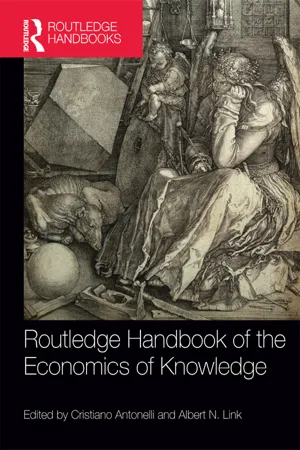
- 272 pages
- English
- ePUB (mobile friendly)
- Available on iOS & Android
Routledge Handbook of the Economics of Knowledge
About This Book
The Routledge Handbook of the Economics of Knowledge provides a comprehensive framework to integrate the advancements over the last 20 years in the analysis of technological knowledge as an economic good, and in the static and dynamic characteristics of its generation process.
There is a growing consensus in the field of economics that knowledge, technological knowledge in particular, is one of the most relevant resources of wealth, yet it is one of the most difficult and complex activities to understand or even to conceptualize. The economics of knowledge is an emerging field that explores the generation, exploitation, and dissemination of technological knowledge. Technological knowledge cannot any longer be regarded as a homogenous good that stems from standardized generation processes. Quite the opposite, technological knowledge appears more and more to be a basket of heterogeneous items, resources, and even experiences. All of these sources, which are both internal and external to the firm, are complementary, as is the interplay between a bottom-up and top-down generation processes. In this context, the interactions between the public research system, private research laboratories, and various networks of learning processes, within and among firms, play a major role in the creation of technological knowledge.
In this Handbook special attention is given to the relationship among technological knowledge and both upstream scientific knowledge and related downstream resources. By addressing the antecedents and consequences of technological knowledge from both an upstream and downstream perspective, this Handbook will become an indispensable tool for scholars and practitioners aiming to master the generation and the use of technological knowledge.
Frequently asked questions
Table of contents
- Cover
- Half Title
- Title Page
- Copyright Page
- Table of Contents
- List of figures
- List of tables
- List of contributors
- 1 Yet another measure of ignorance
- 2 Innovation and creativity: a slogan, nothing but a slogan
- 3 From knowledge to innovation: the role of knowledge spillover entrepreneurship
- 4 Innovation strategies combining internal and external knowledge
- 5 Networks of knowledge: an appraisal of research themes, findings and implications
- 6 Academic networks and the diffusion of knowledge
- 7 Transversal or linear? Knowledge externalities and the complexity of knowledge interactions
- 8 Knowledge cumulability and path dependence in innovation persistence
- 9 Social responsibility and the knowledge production function of higher education: a review of the literature
- 10 An alternative to the economic value of knowledge
- 11 The international dissemination of technological knowledge
- 12 The economic nature of knowledge embodied in standards for technology-based industries
- 13 Towards non-exclusive intellectual property rights
- 14 The dynamics of knowledge governance
- Index